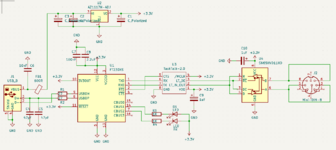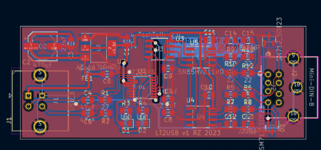twelvetone12
Well-known member
I'm moving the topic of discussing the USB interface to LocalTalk here so we don't OT too much the other thread.
While on the train I drafted a simple adapter. It uses an FT230X instead of the CH340 since the latter seems to have been obsoleted. In my experience with FT230X it is only a 3.3v volt part and will die at 5v, hence I decided to run everything at 3.3. The tranceiver is a SN65HVD12 (even if the schematic says SN65HVD11 since I didn't have the other symbol, and I guess the unit load is the same?) which in 8-SOIC seems to be active and available on DigiKey. I copied the filtering for USB from the datasheets and a couple known-working projects.
I copied the Mini DIN connections from the RPI hat but I'm not 100% sure, so I will have to verify those. I choose an USB-B plug since is is nice, big and sturdy and in my experience mini-usb can be a little fragile especially with hand assembled stuff. My idea is to make it all SMD which I know sounds scary but in reality is very easy to mount by hand, and if ever we need to make a small batch I have the means to do so professionally.
In all this circuit is quite simple and I should be able to do the layout myself quite comfortably. I think then making a DIN-3 or PhoneNet as we discussed on the other thread should by very easy - it just needs a transformer and another chip + connector. We can see then if there is interest.
Comments are welcome and keep in mind this is just the first draft

While on the train I drafted a simple adapter. It uses an FT230X instead of the CH340 since the latter seems to have been obsoleted. In my experience with FT230X it is only a 3.3v volt part and will die at 5v, hence I decided to run everything at 3.3. The tranceiver is a SN65HVD12 (even if the schematic says SN65HVD11 since I didn't have the other symbol, and I guess the unit load is the same?) which in 8-SOIC seems to be active and available on DigiKey. I copied the filtering for USB from the datasheets and a couple known-working projects.
I copied the Mini DIN connections from the RPI hat but I'm not 100% sure, so I will have to verify those. I choose an USB-B plug since is is nice, big and sturdy and in my experience mini-usb can be a little fragile especially with hand assembled stuff. My idea is to make it all SMD which I know sounds scary but in reality is very easy to mount by hand, and if ever we need to make a small batch I have the means to do so professionally.
In all this circuit is quite simple and I should be able to do the layout myself quite comfortably. I think then making a DIN-3 or PhoneNet as we discussed on the other thread should by very easy - it just needs a transformer and another chip + connector. We can see then if there is interest.
Comments are welcome and keep in mind this is just the first draft


